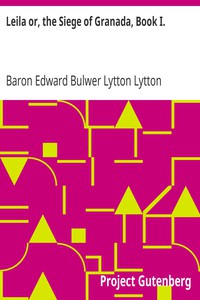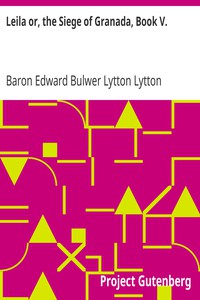Leila or, the Siege of Granada, Book IV., Baron Edward Bulwer Lytton Lytton [ebook reader for pc .TXT] 📗

Book online «Leila or, the Siege of Granada, Book IV., Baron Edward Bulwer Lytton Lytton [ebook reader for pc .TXT] 📗». Author Baron Edward Bulwer Lytton Lytton
"Be it so," returned Boabdil. Then, with Oriental delicacy, selecting the eldest of the officers round him, he gave him instructions to enter the castle, and, with a strong guard, provide for the safety of the women, according to the directions of Quexada. To another of his officers he confided the Spanish prisoners, and gave the signal to his army to withdraw from the spot, leaving only a small body to complete the ruin of the fortress.
Accompanied by Almamen and his principal officers, Boabdil now hastened towards Granada; and while, with slower progress, Quexada and his companions, under a strong escort, took their way across the Vega, a sudden turn in their course brought abruptly before them the tower they had so valiantly defended. There it still stood, proud and stern, amidst the blackened and broken wrecks around it, shooting aloft, dark and grim, against the sky. Another moment, and a mighty crash sounded on their ears, while the tower fell to the earth, amidst volumes of wreathing smoke and showers of dust, which were borne, by the concussion to the spot on which they took their last gaze of the proudest fortress on which the Moors of Granada had beheld, from their own walls, the standard of Arragon and Castile.
At the same time, Leila—thus brought so strangely within the very reach of her father and her lover, and yet, by a mysterious fate, still divided from both,—with Donna Inez, and the rest of the females of the garrison, pursued her melancholy path along the ridges of the mountains.
CHAPTER II. ALMAMEN'S PROPOSED ENTERPRISE.—THE THREE ISRAELITES—CIRCUMSTANCE IMPRESSES EACH CHARACTER WITH A VARYING DIE.Boadbil followed up his late success with a series of brilliant assaults on-the neighbouring fortresses. Granada, like a strong man bowed to the ground, wrenched one after one the bands that had crippled her liberty and strength; and, at length, after regaining a considerable portion of the surrounding territory, the king resolved to lay siege to the seaport of Salobrena. Could he obtain this town, Boabdil, by establishing communication between the sea and Granada, would both be enabled to avail himself of the assistance of his African allies, and also prevent the Spaniards from cutting off supplies to the city, should they again besiege it. Thither, then, accompanied by Muza, the Moorish king bore his victorious standard.
On the eve of his departure, Almamen sought the king's presence. A great change had come over the canton since the departure of Ferdinand; his wonted stateliness of mien was gone; his eyes were sunk and hollow; his manner disturbed and absent. In fact, his love for his daughter made the sole softness of his character; and that daughter was in the hands of the king who had sentenced the father to the tortures of the Inquisition! To what dangers might she not be subjected, by the intolerant zeal of conversion! and could that frame, and gentle heart, brave the terrific engines that might be brought against her fears? "Better," thought he, "that she should perish, even by the torture, than adopt that hated faith." He gnashed his teeth in agony at either alternative. His dreams, his objects, his revenge, his ambition—all forsook him: one single hope, one thought, completely mastered his stormy passions and fitful intellect.
In this mood the pretended santon met Boabdil. He represented to the king, over whom his influence had prodigiously increased since the late victories of the Moors, the necessity of employing the armies of Ferdinand at a distance. He proposed, in furtherance of this policy, to venture himself in Cordova; to endeavour secretly to stir up those Moors, in that, their ancient kingdom, who had succumbed to the Spanish yoke, and whose hopes might naturally be inflamed by the recent successes of Boabdil; and, at least, to foment such disturbances as might afford the king sufficient time to complete his designs, and recruit his force by aid of the powers with which he was in league.
The representations of Almamen at length conquered Boabdil's reluctance to part with his sacred guide; and it was finally arranged that the Israelite should at once depart from the city.
As Almamen pursued homeward his solitary way, he found himself suddenly accosted in the Hebrew tongue. He turned hastily, and saw before him an old man in the Jewish gown: he recognised Elias, one of the wealthiest and most eminent of the race of Israel.
"Pardon me, wise countryman!" said the Jew, bowing to the earth, "but I cannot resist the temptation of claiming kindred with one through whom the horn of Israel may be so triumphantly exalted."
"Hush, man!" said Almamen, quickly, and looking sharply round; "I thy countryman! Art thou not, as thy speech betokens, an Israelite?"
"Yea," returned the Jew, "and of the same tribe as thy honoured father— peace be with his ashes! I remembered thee at once, boy though thou wert when thy steps shook off the dust against Granada. I remembered thee, I say, at once, on thy return; but I have kept thy secret, trusting that, through thy soul and genius, thy fallen brethren might put off sackcloth and feast upon the house-tops."
Almamen looked hard at the keen, sharp, Arab features of the Jew; and at length he answered, "And how can Israel be restored? wilt thou fight for her?"
"I am too old, son of Issachar, to bear arms; but our tribes are many, and our youth strong. Amid these disturbances between dog and dog—"
"The lion may get his own," interrupted Almamen, impetuously,—"let us hope it. Hast thou heard of the new persecutions against us that the false Nazarene king has already commenced in Cordova—persecutions that make the heart sick and the blood cold?"
"Alas!" replied Elias, "such woes indeed have not failed to reach mine ear; and I have kindred, near and beloved kindred, wealthy and honoured men, scattered throughout that land."
"Were it not better that they should die on the field than by the rack?" exclaimed Almamen, fiercely. "God of my fathers! if there be yet a spark of manhood left amongst thy people, let thy servant fan it to a flame, that shall burn as the fire burns the stubble, so that the earth may bare before the blaze!"
"Nay," said Elias, dismayed rather than excited by the vehemence of his comrade,—"be not rash, son of Issachar, be not rash: peradventure thou wilt but exasperate the wrath of the rulers, and our substance thereby will be utterly consumed."
Almamen drew back, placed his hand quietly on the Jew's shoulder, looked him hard in the face, and, gently laughing, turned away.
Elias did not attempt to arrest his steps. "Impracticable," he muttered; "impracticable and dangerous! I always thought so. He may do us harm: were he not so strong and fierce, I would put my knife under his left rib. Verily, gold is a great thing; and—out on me! the knaves at home will be wasting the oil, now they know old Elias is abroad." Thereat the Jew drew his cloak around him, and quickened his pace.
Almamen, in the meanwhile, sought, through dark and subterranean passages, known only to himself, his accustomed home. He passed much of the night alone; but, ere the morning star announced to the mountain tops the presence of the sun, he stood, prepared for his journey, in his secret vault, by the door of the subterranean passages, with old Ximen beside him.
"I go, Ximen," said Almamen, "upon a doubtful quest: whether I discover my daughter, and succeed in bearing her in safety from their contaminating grasp, or whether I fall into their snares and perish, there is an equal chance that I may return no more to Granada. Should this be so, you will be heir to such wealth as I leave in these places I know that your age will be consoled for the lack of children when your eyes look upon the laugh of gold."
Ximen bowed low, and mumbled out some inaudible protestations and thanks. Almamen sighed heavily as he looked round the room. "I have evil omens in my soul, and evil prophecies in my books," said he, mournfully. "But the worst is here," he added, putting his finger significantly to his temples; "the string is stretched—one more blow would snap it."
As he thus said, he opened the door and vanished through that labyrinth of galleries by which he was enabled at all times to reach unobserved either the palace of the Alhambra or the gardens without the gates of the city.
Ximen remained behind a few moments in deep thought. "All mine if he dies!" said he: "all mine if he does not return! All mine, all mine! and I have not a child nor a kinsman in the world to clutch it away from me!" With that he locked the vault, and returned to the upper air.
CHAPTER III. THE FUGITIVE AND THE MEETINGIn their different directions the rival kings were equally successful. Salobrena, but lately conquered by the Christians, was thrown into a commotion by the first glimpse of Boabdil's banners; the populace rose, beat back their Christian guards, and opened the gates to the last of their race of kings. The garrison alone, to which the Spaniards retreated, resisted Boabdil's arms; and, defended by, impregnable walls, promised an obstinate and bloody siege.
Meanwhile, Ferdinand had no sooner entered Cordova than his extensive scheme of confiscation and holy persecution commenced. Not only did more than five hundred Jews perish in the dark and secret gripe of the Grand Inquisitor, but several hundred of the wealthiest Christian families, in whose blood was detected the hereditary Jewish taint, were thrown into prison; and such as were most fortunate purchased life by the sacrifice of half their treasures. At this time, however, there suddenly broke forth a formidable insurrection amongst these miserable subjects—the Messenians of the Iberian Sparta. The Jews were so far aroused from their long debasement by omnipotent despair, that a single spark, falling on the ashes of their ancient spirit, rekindled the flame of the descendants of the fierce warriors of Palestine. They were encouraged and assisted by the suspected Christians, who had been involved in the same persecution; and the whole were headed by a man who appeared suddenly amongst them, and whose fiery eloquence and martial spirit produced, at such a season, the most fervent enthusiasm. Unhappily, the whole details of this singular outbreak are withheld from us; only by wary hints and guarded allusions do the Spanish chroniclers apprise us of its existence and its perils. It is clear that all narrative of an event that might afford the most dangerous precedent, and was alarming to the pride and avarice of the Spanish king, as well as the pious zeal of the Church, was strictly forbidden; and the conspiracy was hushed in the dread silence of the Inquisition, into whose hands the principal conspirators ultimately fell. We learn, only, that a determined and sanguinary struggle was followed by the triumph of Ferdinand, and the complete extinction of the treason.
It was one evening, that a solitary fugitive, hard chased by an armed troop of the brothers of St. Hermandad, was seen emerging from a wild and rocky defile, which opened abruptly on the gardens of a small, and, by the absence of fortification and sentries, seemingly deserted, castle. Behind him; in the exceeding stillness which characterises the air of a Spanish twilight, he heard, at a considerable distance the blast of the horn and the tramp of hoofs. His pursuers, divided into several detachments, were scouring the country after him, as the fishermen draw their nets, from bank to bank, conscious that the prey they drive before the meshes cannot escape them at the last. The fugitive halted in doubt, and gazed round him: he was well-nigh exhausted; his eyes were bloodshot; the large drops rolled fast down his brow; his whole frame quivered and palpitated, like that of a stag when he stands at bay. Beyond the castle spread a broad plain, far as the eye could reach, without shrub or hollow to conceal his form: flight across a space so favourable to his pursuers was evidently in vain. No alternative was left unless he turned back on the very path taken by the horsemen, or trusted to





Comments (0)